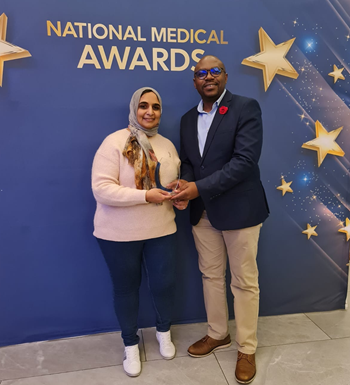BY Nkosazana Ngwadla
Senior lecturer in biokinetics at Nelson Mandela University’s Human Movement Science Department Dr Aayesha Kholvadia recently received the Healthcare Leadership Award from The Alliance of South Africa Independent Practitioners Associations (ASAIPA).
Dr Kholvadia received the award together with Dr Takalani Muluvhu, biokinetics lecturer at Tshwane University of Technology, at ASAIPA’S National Medical Awards for their advancement of biokinetic services in the public health sector.
“Receiving the National Medical Award and Healthcare Leadership Award means the world to me, as it acknowledges my unwavering dedication to promoting health and wellbeing in society through physical activity initiatives.
“It fills me with immense happiness to be recognized for my service and reinforces my commitment to making a positive impact on individuals’ lives,” said Dr Kholvadia. ASAIPA is a national network organisation, representing 13 independent practitioners’ associations throughout South Africa.
Drs Kholvadia and Muluvhu’s collaborative efforts focused on the importance of addressing non-communicable diseases (NCDs), such as cardiovascular diseases, diabetes, and obesity, and managing these with exercise and movement.
They further worked on extending biokinetic services to the public, particularly in South Africa, where NCDs pose a significant burden. In this way health and quality of life will improve if the impact of NCDs decrease, ultimately contributing to a healthier society.
These diseases are associated with various risk factors, including sedentary lifestyles, poor dietary habits, and limited access to healthcare services.
Biokinetics, which focuses on exercise and movement as therapy, has proven to be effective in preventing and managing NCDs. However, the availability of Biokinetic services has been limited in the public health sector, leading to a significant gap in addressing these health issues.
Drs Kholvadia and Muluvhu worked towards integrating Biokinetics into the public health sector, bridging the gap in preventive and therapeutic interventions for NCDs and enhancing healthcare delivery.
They also developed tailored programmes for individuals affected by NCDs to engage in physical activity and adopt healthier lifestyles.
Through advocacy and strategic partnerships with government entities, healthcare institutions, and community organisations, the collaboration successfully established biokinetic services within the public health sector as well as personalised interventions. considering age and socioeconomic backgrounds.
Workshops, seminars, and educational initiatives were organised to ensure that healthcare providers were equipped with the necessary knowledge and skills to deliver high-quality biokinetic services.
Research showed that therapy led to a reduction in cardiovascular risks, improved glycaemic control among diabetes patients, and enhanced weight management outcomes, among other positive health indicators.
Image and source: NMU












